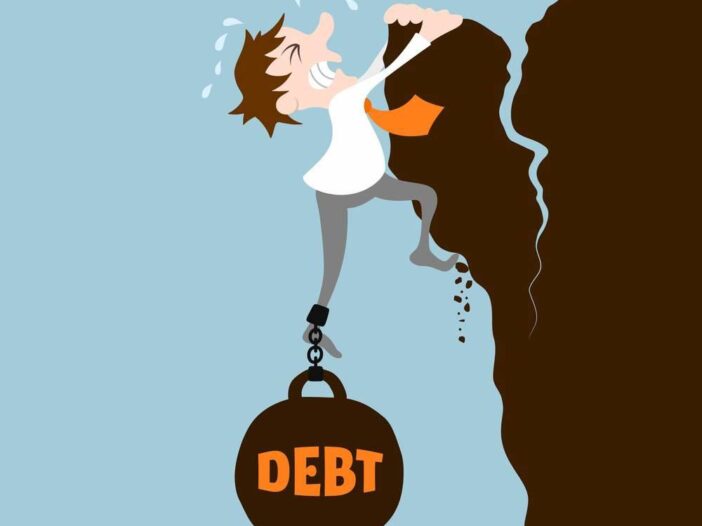Debt — it’s an integral part of our modern financial system.
We borrow money, we spend it, we pay it back. It should be as simple as that.
But, as you may know, it’s not always that easy.
A lot of people can let debt get out of hand. Sometimes through ignorance and sometimes through sheer stupidity. Either way, the outcome is usually disastrous.
No good ever comes from taking a carefree approach to debt.
And that doesn’t just go for individuals either. Organisations and governments can be just as bad with debt as anyone else.
Which brings us to our current situation. Our corporate and government debt is reaching new extremes. To the point that Australia is potentially looking at a credit downgrade. Stripping us of our AAA rating.
Now, to be honest, when it comes to the economy this wouldn’t really mean that much. And I’ve no doubt getting back to that triple AAA rating will be possible.
This is simply a reaction to the extreme spending needed to cushion the corona recession. A short-term boost to prop up our economy. But the hard part still lies before us.
We’ve handled the COVID-19 health risk pretty damn well. Unlike the rest of the world, we’re likely to come out the other side relatively unscathed in terms of loss of life. A damn fine achievement.
However, moving forward we will face the next challenge. That is, keeping our economy in tact without maxing out on debt.
This is not a time to panic. It’s a time for ACTION. Click here to download your free report now.
Debt binge
As you’ve probably seen or heard, Virgin is the talk of the town at the moment. A lot of people have some very strong opinions about whether they should have been bailed out or not.
I’m not going to pretend I have all the details to make an informed opinion on the matter. But, I will simply say, I’m glad the bailout didn’t go ahead for one reason: precedent.
If there is anything to be learnt from the US, it is that corporate bailouts are a risky road to head down. Once you start bailing out one company or industry, then the rest come knocking. They have snowballed their corporate handouts to new extremes.
Some of these bailout recipients may be worthy. Many though, are not.
There is a point where you just have to let businesses fail. Especially when you see just how irresponsible debt has become…
See, back in the early ‘90s, almost 30 years ago, more than 60 US companies had AAA credit ratings. Businesses that were financial powerhouses with tidy balance sheets.
Today, there are only two AAA-rated companies in the US. They are Johnson & Johnson and Microsoft.
Debt has become far too easy to access for US firms. And with the option of a government bailout waiting for them if they fail, why wouldn’t they load up? They can just pull a Boeing and use US jobs as leverage for a timely handout.
Worst still, it has a detrimental impact on competition.
By preventing these companies from failing, they are propping up bad practices. Every other competitor, that didn’t borrow ungodly amounts of money, simply doesn’t have the capital to compete. All it does it lead to a never-ending bubble that pops and reflates.
I seriously hope Australia doesn’t repeat these same mistakes.
Because at the end of the day, when used responsibly, debt can be a great thing.
Borrowing the right way
At the end of the day, debt is important. It is a tool that helps bring about innovation and growth.
In the right hands, with the right idea, a massive debt can be miraculous. Just look at Amazon, for example.
It is now a US$1.2 trillion company. One of the few stocks that has not only defied the corona downturn, but boomed during it.
Yet, 20 years ago Amazon almost went bankrupt. A company that almost collapsed under the weight of its enormous debt. As The Guardian reported all the way back on 27 June 2000:
‘The day had cost Bezos personally around a billion dollars.
‘It began with a report from Lehman Brothers, the investment bank, warning that the company was haemorrhaging cash and might not survive. Analyst Ravi Suria highlighted Amazon’s “weak balance sheet, poor working capital management, and massive negative operating cashflow – the financial characteristics that have driven innumerable retailers to disaster through history.”
‘It was a day during which Amazon’s shares lost 20% of their value, and 51m of them changed hands. A company worth about $40bn (£25bn) just before Christmas had ended the day worth $12bn (£7.5bn), and things did not improve during trading yesterday.’
Amazon was loaded up with debt, was making very little money, and was about to face its biggest challenge to date: the dotcom crash.
In many ways, it’s a miracle that Amazon survived. But, it certainly wasn’t down to chance. And with a heavy dose of irony, in 2008, the same year Lehman Brothers collapsed, Amazon paid off its enormous debt.
It’s a perfect example of debt used exquisitely. A company that had to burn through a whole lot of cash so it could become the biggest publicly traded stock in the world.
Unfortunately, not every business can be Amazon-like though. They were one of the very lucky ones.
My point is, when debt is used correctly it is a powerful tool. In the wrong hands though, all it will do is ruin us.
Regards,
Ryan Clarkson-Ledward,
Editor, Money Morning
PS: In this free guide, discover how a currency crisis could drain the supply of circulating cash…and how you can keep your standard of living when going through it. Download the free guide now.

